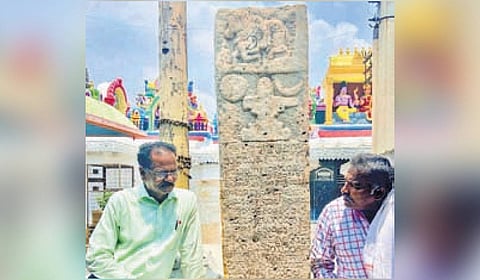

GUNTUR: A 16th-century stone inscription from the Vijayanagara Empire era is gradually sinking into the ground at the Vankeswara temple in Durgi mandal headquarters, Palnadu district, raising alarms among historians and heritage enthusiasts.
Noted archaeologist and Pleach India Foundation Chief Executive Officer (CEO) E Sivanagireddy inspected the site on Friday after receiving information from local sculptor Ch Srinivasachary.
He confirmed that the inscription, issued in the name of Emperor Sri Krishnadevaraya, dates back to November 22, 1518 CE and was commissioned by Timmapa Nayanim Garu, a doorkeeper in Krishnadevaraya’s court.
The inscription records a royal grant of Gundala village for temple festivities. Originally carved in classical Telugu with 55 lines of text, only the top 19 lines are visible, while the rest is buried.
Sivanagireddy emphasised the inscription’s historical, linguistic, and spiritual importance and urged immediate preservation.
He recommended excavation, mounting the stone on a pedestal, and installing interpretive signage to highlight its context. If preserved properly, he believes it could be a valuable resource for researchers and a proud symbol of Palnadu’s heritage.